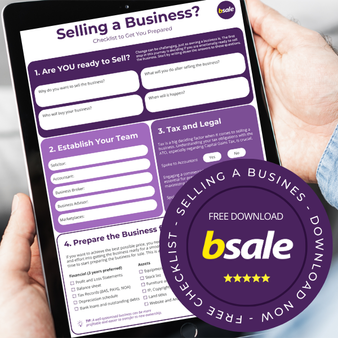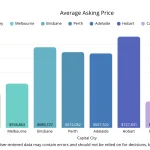Your Guide on How to Sell a Business in Australia

Your Guide to Selling a Business
For many Aussie business owners, selling a business is a once in a lifetime event and it often stirs up a mix of emotions. Whether you're retiring, moving on to something new, or simply ready for change, understanding how to sell a business is key to getting the outcome you want.
Selling isn’t as simple as listing, handing over the keys and walking away. Many owners underestimate just how involved the process can be.
At Bsale, we’ve been connecting buyers and sellers since 2000. We’ve seen thousands of businesses come to market. This guide walks you through how to sell a business in Australia, step by step from preparing for sale, to finding a buyer, negotiating the deal, and handing over the reins. So when it’s time to get professional advice, you’ll have an idea of what to expect.
We've mapped out how to sell a business in 10 stages (yes 10!)
1. Get Emotionally Ready to Sell
2. Establish Your Team
3. Dont Sell Until you Understand Your Tax and Legal Obligation
4. Prepare Your Business
5. Get a Valuation or Appraisal
6. Create an Information Memorandum
7. Market Your Business for Sale
8. Enter Negotiations and Due Dilligence
9. Preparing Contract of Sale
10. Settlement and Transfer
To make it easier we have created a checklist and PDF version of this guide, so you can print it out and get started on your list.


1. Get Emotionally Ready to Exit
Selling a business isn’t just about listing it online and handing over all the accounts and keys. It’s a detailed process that requires planning, preparation, and often, a bit of soul searching. As a business owner, you’ve poured time, energy, and passion into building something valuable and it’s completely normal to feel a mix of emotions when thinking about selling.
In fact, one of the first steps in learning how to sell a business is getting clear on your own intentions. Are you truly ready to sell? For many owners, their business is closely tied to their identity. Letting go can feel overwhelming, and the thought of life after the sale may be hard to imagine.
Selling a business is a major decision, and it’s not just about the numbers it’s about timing, mindset, and clarity. Before you contact a broker or speak to a buyer, take a moment to sit down and reflect. Why are you selling? What are your goals? What will life look like after the handover? When do you actually want to sell?
Getting emotionally prepared is just as important as getting financially and legally ready. By tackling these questions early, you’ll be in a better position to move through the sales process with confidence, not confusion.
In the checklist you can download we split this into four sections
- Why do you want to sell the business?
- What will you do after selling the business?
- Who do you think will buy your business?
- When do you think the business will sell and are you ready for the wait?
Once you've sorted through your thoughts and emotions, it’s a good idea to talk with someone, such a professional counselor who assists business owners.
When selling a business, you want to be 100% committed to the decision so you can try to avoid mistakes. It can take time to sell, so you need to be emotionally ready for the entire process. Most owners have a hand over period, which could last up to 12 months, depending on the complexities of the business.
We've heard many deals fall over, when the owner re-thinks their plans to sell, or their kids start putting up their hands to take over (after declining many times). So spending time going through your emotions and getting ready from all angles is important.

2. Establish Your Team
Good news! You don’t have to go about selling a business on your own.
Many business owners are experienced in running their business but have no idea how to sell it. Luckily, there are a number of professionals who can assist in the process.
-
Solicitor: You will need legal advice and services to help prepare your business, NDA, Heads of Agreement, Contract of Sale, and assist with negotiations and structuring the deal. It's important to engage a solicitor with specialized experience in commercial sales to ensure the contract is prepared correctly.
-
Accountant: Your accountant is vital in preparing the necessary financial documents and helping you understand your tax obligations. The way you structure the sale of your business may impact the tax you could be liable for, so having a reliable accountant is crucial.
-
Business Broker: You can find a business broker who specializes in preparing, advertising, negotiating, and guiding business sales to settlement. They can offer market insights and manage the sale process on your behalf. Its a good idea at this point to evaluate whether you want to sell with a business broker or privately and to understand the fees and commissions involved.
-
Business Coach: Engaging a business coach specific to your industry can help ready the business for sale and maximise its value.
-
Marketplaces: Research which are the best business for sale marketplaces to advertise your business sale on. Whether you are selling privately going to upload your ad details to multiple websites or are using a business broker - its important to know which ones you want your ad to appear on.

3. Dont Sell Until You Understand Your Tax Obligations and Legal Requirements
Selling a business can be more complex than real estate with various legal and tax considerations. These need to be reviewed well before you start advertising your business for sale as they can significantly impact reaching a smooth settlement.
-
Tax Obligations
Tax is a big deciding factor when it comes to selling a business. Understanding your tax obligations with the ATO, especially regarding Capital Gains Tax (CGT), is crucial. Speak with your accountant early in the process for tax planning.
There are a number of CGT tax consessions available for small businesses with a turnover under $2 million. For example, If you have owned the active asset for at least 15 years, are over 55, and are retiring, 100% of the capital gain will not be subject to CGT. Its important you speak with your accountant early in the process for tax planning so you understand your tax obligations before you advertise to sell a business. -
Legal Requirements
Legal assistance is crucial when selling a business. Engaging a commercial solicitor early in the process is essential for preparing your business for sale and maximizing its value.
A commercial solicitor ensures everything is legally sound within your business, such as reviewing key contracts that may impact the sale, like rental leases or supplier agreements that could be affected by ownership transfer. They can also review employee contracts and suggest ways to ensure a smooth transition for key employees.
In terms of the actual sale, a solicitor will provide a non-disclosure agreement (NDA) to potential buyers to assist with confidentiality. They will then help review the buyers offer and create a term sheet, prepare a Heads of Agreement (HOA), draft the Contract of Sale, and finalize the agreement. It is vital to engage a commercial solicitor experienced in business sales, as they can effectively steer negotiations to settlement and ensure the right terms and conditions are included.

4. Prepare Your Business Sale
At this stage, you should have established a team to help prepare your business for sale. They will provide advice and guidance on transitioning your business from its current state to new ownership. Many business owners are often surprised by how much time it takes to get everything organized to maximize the sale value. Selling a business is similar to selling an asset—if you want to achieve the best possible price, you need to invest time and effort into making it the best possible version for a smooth handover.
Here are some popular strategies to get a business ready to sell:
- Organise Your Documents: Collect all your financial, operational and asset-related documents, and download the Bsale Checklist for common documents required. These will be used to determine the asking price for the business and reviewed during the due diligence process.
- Create More Systems: A well-systemized business is easier to transfer. When you plan to exit your business or train a new buyer, having systems in place will make the transition smoother. Assign roles to your team to review training videos, build flow charts, and set up checklists. The more systems you implement, the easier it will be for the buyer and for the business sale. Aim to create a certain number of systems each week.
- Prepare Employees: Many business owners choose not to inform employees of the sale until a settlement is reached, fearing the loss of key team members or the spread of confidential information. However, it’s still wise to prepare your employees for the sale by reviewing employment contracts, roles, staff incentives, and communication methods. To ensure a smooth transition, employees need to feel valued under the new management and have a clear understanding of their roles and responsibilities.


5. Get a Valuation or Appraisal
With all your documents organized, you can start setting a price for your business. There are four main methods to obtain a price guide for your business, and it’s advisable to get appraisals or valuations from multiple sources for comparison.
-
Accountant: Your accountant can set a price based on the financial profitability of the business, often using a multiple to determine the value. This method may not fully account for market conditions or buyer awareness but is a good starting point.
-
Business Valuer: Qualified business valuers charge a flat fee starting from around $3,000 to provide a valuation. This document is often used in court proceedings or when multiple business owners are involved in the sale to reduce disputes. Business valuers review financials, assess market conditions, and offer guidance on increasing your sale value.
-
Business Broker: Business brokers typically provide an appraisal based on market conditions and the estimated sale value of similar businesses. They consider the profitability of your business, its readiness for sale, and recently sold businesses to determine the price.
-
Market Research: Research similar businesses for sale and make comparisons. Understand what is currently on the market, who is selling, and what they are offering. Its a good idea to sign up for alerts so you can be notified when a new businesses is listed for sale in your area or industry.
By exploring these methods, you can arrive at a well-informed and competitive price for your business.

6. Create an Information Memorandum (IM)
The Information Memorandum (IM) is one of the most crucial documents used when communicating with potential buyers during the sale of a business. Its main purpose is to provide detailed information about the business to prospective buyers. This document can include details about the business's operations, financials, company structure, and more. Typically formatted as a PDF, it can be emailed or printed and is often created by the business owner, sometimes with the assistance of an accountant or business broker.
An IM is usually provided to a potential buyer after they have signed a Non-Disclosure Agreement (NDA) and the seller is confident that the buyer is genuinely interested.
> Learn More About Information Memorandums

7. Market Your Business for Sale
You are now equipped with all the key components required for selling a business. Now is the time to market the business and attract enquiries from interested buyers.
In Australia, it typically takes about 6-9 months to sell a business, so you need to be prepared for the process. It's very important to keep your business profitable during this period and continue building your systems to ensure a smooth handover.
If you choose to sell with a business broker, you will collaborate with them to establish a marketing plan and advertise the business for sale. The broker will handle enquiries from potential buyers and work on your behalf, usually charging a marketing fee to cover advertising expenses.
If you decide to sell your business privately, you will need to create a marketing plan and set up advertisements on business for sale websites like Bsale to attract enquiries.
When marketing your business for sale its important to create an engaging ad that can attract buyers.
Importantly, don’t rely on a single source for advertising. Utilize multiple platforms and networks to increase exposure and expand your pool of potential buyers. Consider reaching out to competitors, suppliers, and employees, as your perfect buyer might be someone already connected to the business. Be prepared for enquiries from those not genuinely interested in buying the business, and have strategies to filter them out.
By implementing these strategies, you can effectively market your business and attract people serious about buying a business, which will hopefully lead to a successful sale.

8. Enter Negotiations and Due Diligence
Once you start receiving enquiries and have provided your Information Memorandum (IM), you may receive an offer, marking the beginning of negotiations. It’s crucial to have your solicitor involved during this process to avoid any potential issues. The buyer will typically provide a written offer, and a term sheet is established to outline what will occur during the due diligence process.
A deposit is usually made once both parties have agreed to the term sheet. This deposit, often around 10% of the purchase price, demonstrates the buyer’s commitment and is held in a trust account by a solicitor or business broker until the sale is finalized.
The buyer will then begin their due diligence process, verifying the business's financial and operational details. Upon completing due diligence, the buyer may have additional requests. A Heads of Agreement (HOA) is often used to negotiate the terms of the sale between the buyer and seller. The specifics may vary depending on your state or the solicitor you are working with, so always seek professional advice for your circumstances.
Successful negotiation requires clear communication. Involving a third party such as a solicitor, accountant, or business broker can help navigate the process with less emotional involvement from the business owner. There are usually several parties involved in the negotiation phase, and it is important to maintain an open dialogue to address issues and negotiate effectively.
As the seller, you need to understand your goals, including your minimum acceptable terms and ideal outcomes, and have a solid grasp of your business’s financials, operations, and value propositions. Misrepresenting information or hiding details can cause the deal to fall through, potentially resulting in significant costs.

9. Prepare the Contract of Sale
Once all parties have agreed on the terms and conditions of the sale, the Heads of Agreement (HOA) will usually be used to draft the legally binding Contract of Sale. The solicitor will prepare the final Contract of Sale and issue it to the buyer. Once all parties have signed the contract, the business sale becomes legally binding and a settlement date is set.
The Business Sale Contract, also known as the Sale of Business Agreement, outlines all the essential details and obligations of both the seller and the buyer. This includes:
- Purchase Price: The agreed sale price of the business.
- Deposit: The amount of the deposit already paid by the buyer, often held in a trust account.
- Assets Included in the Sale: A detailed list of all physical and intangible assets included in the sale, such as equipment, inventory, intellectual property, and customer lists.
- Liabilities and Debts: Any liabilities or debts that the buyer will assume.
- Employee Arrangements: Terms related to the transfer of employees, including employment contracts and accrued entitlements.
- Lease Agreements: Details of any property lease arrangements that will be transferred to the buyer.
- Warranties and Representations: Assurances from the seller regarding the condition of the business and its compliance with all laws and regulations.
- Non-Compete Clauses: Any agreements preventing the seller from starting a competing business within a specified time frame and geographical area.
- Handover Period: The duration and terms of any transition period during which the seller will assist the buyer in taking over the business.
- Conditions Precedent: Any conditions that must be fulfilled before the sale can be completed, such as obtaining necessary approvals or permits.
- Settlement Date: The agreed-upon date when the transfer of ownership will officially take place.
Both the seller and buyer are now obligated to adhere to the terms outlined in the Business Sale Contract. This comprehensive document ensures that both parties are clear on their responsibilities and helps prevent disputes during the transition of ownership.

10. Settlement and Transfer
Congratulations, your business is now sold!
As the business owner, you're likely feeling a mix of emotions. It's exciting to have completed the negotiations, but it can also be daunting to step away from the business you've built.
With the transfer of funds now complete, you will begin the process of transferring key information such as business registrations, passwords, keys, operational procedures, and more. It’s advisable to review the Australian Government Checklist to ensure you covered everything.
As the seller, you are bound by the conditions of the Business Sale Contract, which may include a handover or training period. This period is an excellent opportunity to introduce the buyer to key people within your business, such as employees, suppliers, distributors, and customers. The training period can vary from 2 weeks to 12 months, depending on the type and size of your business.
Now is a good time to visit your accountant to plan your next steps. It might also be wise to consult a financial advisor to determine how best to invest the proceeds from the sale.

Disclaimer: This guide provides general information and should not be considered professional advice. Always consult with a licensed professional when selling a business.
Originally published 2021. Updated July 9, 2025
Tags: selling tips small business selling a business
About the author

Vanessa Lovie-Yousaf
CEO Bsale Australia
Vanessa Lovie-Yousaf is the CEO and manager of Bsale.com.au, one of Australia’s most trusted business for sale marketplaces since 2000. With 15 ...









